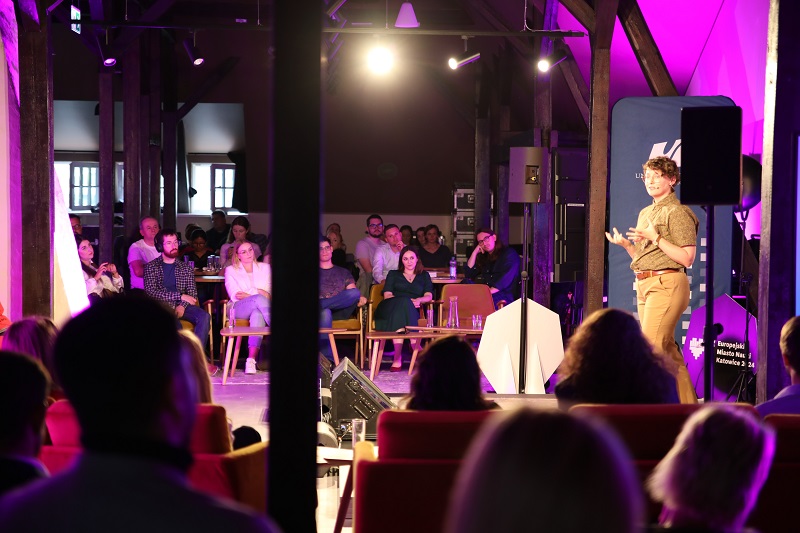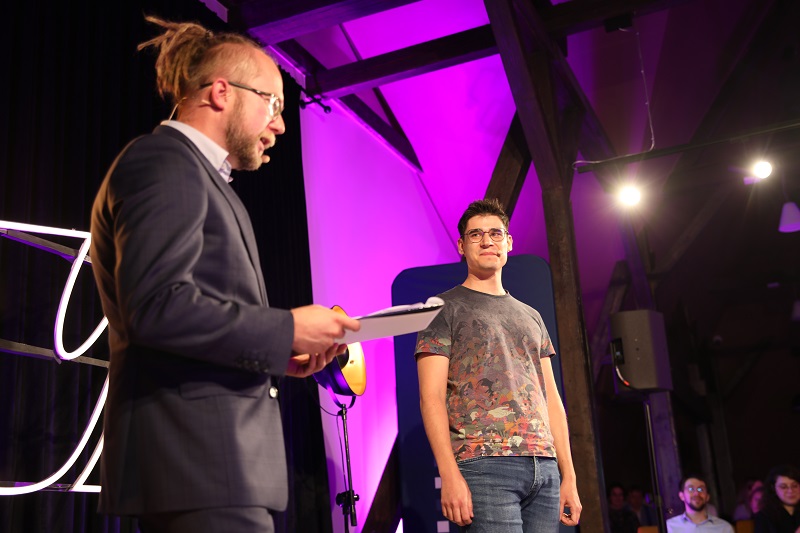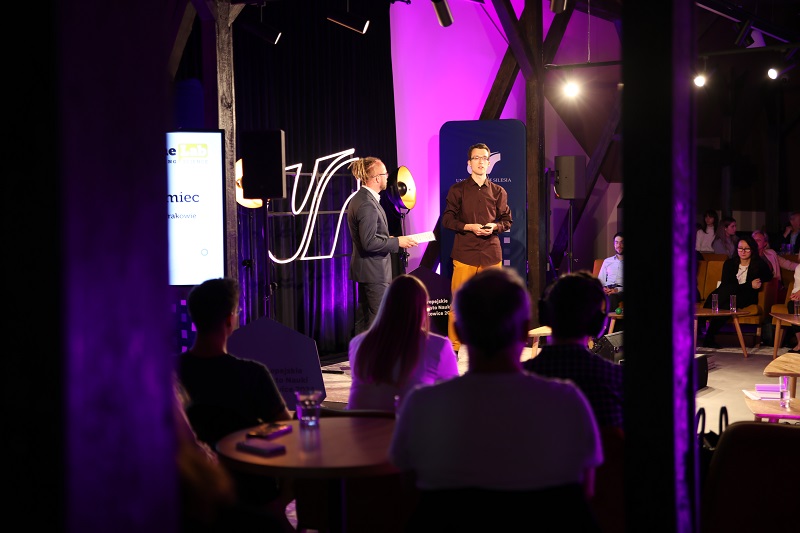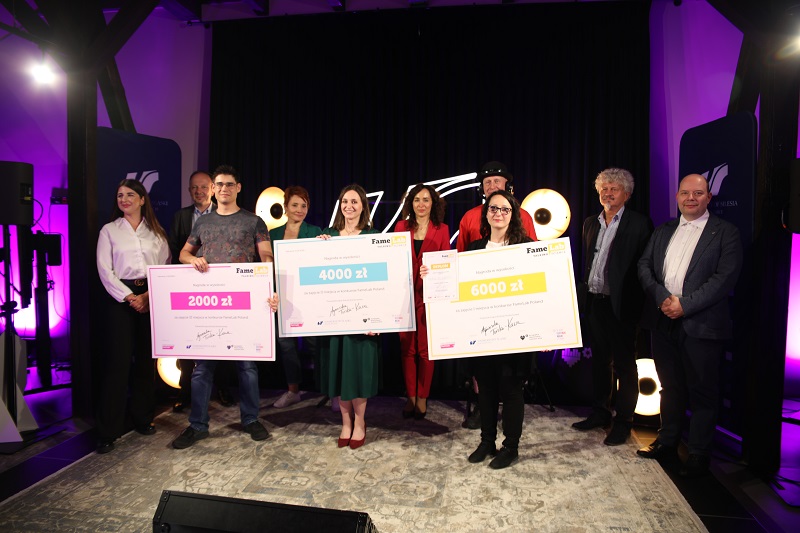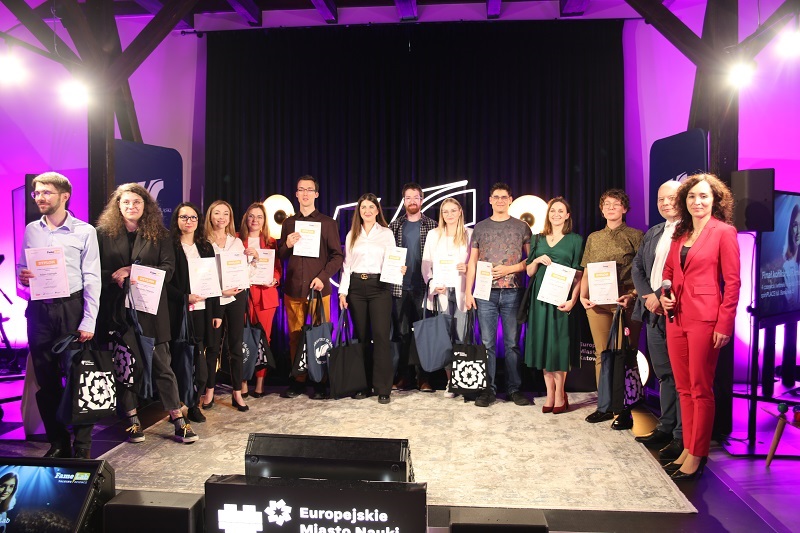| Magdalena Gołąbek |
They can talk about various research disciplines in a way that makes others want to listen to them. Even though the topics they are passionate about can be complicated, they are able to “sell” them in an easy and enjoyable way. And on top of that, they engage their audiences in a way that keeps them curious of what else they will learn.
Who are they? The Polish finalists of the world’s largest science communication competition — FameLab. This year’s edition of FameLab Poland (which has the status of national finals) as part of the European City of Science celebrations took place at the University of Silesia in the spinPLACE building.
What attractions awaited those gathered?
On Monday, 3 June, the FameLab finalists started the day with masterclass session with performer David Price from Science Made Simple and EUSEA (European Science Engagement Association), who taught them how to… levitate! Who would have thought that one red balloon could bring so much joy. Participants also learned what tricks to use on stage to ensure that one’s performance will be remembered. During a “science busking” session, they practiced how to hook an indifferent or bored recipient on the world of science. Towards the end, the coach emphasised how important it is to have your own style and find something that will distinguish you. For example, David Price himself wears a red shirt and a black bowler hat which have become his trademarks. In the next (afternoon) part of the event, David conducted consultations with the finalists before their main speech. He advised on what works and what doesn’t. He talked about the importance of body language, gestures and eye contact. All this, if done properly, will engage the recipient and make them focus on us.
Photo by Katarzyna Suchańska
Photo by Katarzyna Suchańska
Photo by Katarzyna Suchańska
Those who qualified for the competition were also offered workshops conducted by Łukasz Lamża – Programme Director for 50 Weeks in the European City of Science. The science communicator talked, among other things, about the formula of public speaking and the importance of thinking about what we want to convey, as well as paying attention to who we are speaking to — are they school students or maybe specialists in a given field? He emphasised how important it is to choose the language according to the target group.
The next day, the FameLab finalists, under the supervision of Wisława Świątek, a lector and a voice teacher, warmed up their vocal chords to enter the stage appropriately prepared. The session began with exercises meant to activate the speech apparatus. The trainer demonstrated how to breathe properly and how to deal with stage fright. There were also tongue twisters, which even our foreign guests practiced during the coffee break.
The organisation of the FameLab finals in the spinPLACE Centre for Creativity and Coworking in the Rawa Club gave the event a unique, but at the same time very informal atmosphere. People presenting a wide range of interests from various cities in Poland came to Silesia. One of the participants – Adam Czempik, apart from nanotechnology, is also passionate about choir singing, while Daniel Niemiec is involved in central banking and monetary policy. The next finalist, Zuzanna Kamykowska, combines her work and hobbies in an interesting way on a daily basis, as she is an economist and art historian. Alicja Kawalec explores topics related to the human psyche and its disorders, and Natalia Szkop deals with communication competences. The topics of the finalists’ presentations also included fields such as chemistry, biology, physics and literary studies.
According to the event’s formula, each participant had 180 seconds to present their topic. After three minutes, a gong would sound, the person would finish their speech, and the jury would assess it and ask for details related to the content. One of the participants spoke Chinese and focused on convincing the audience that this language is simpler than Polish. Another one encouraged people to find their own learning style, emphasising that it is a helpful tool in better knowledge acquisition.
Photo by Katarzyna Suchańska
Photo by Katarzyna Suchańska
However, the jury was most impressed by Marcelina Jureczko from the Silesian University of Technology in Gliwice who presented the topic of mushrooms, which have medicinal properties and can fight cancer cells as well as prevent their formation. She was the one to receive the first prize of PLN 6,000. The second prize of PLN 4,000 went to Emilie Szwajnoch from the University of Silesia, who talked about the Chinese social trust system. And the third distinction and PLN 2,000 went to Bartosz Szóstak, also from the University of Silesia, who explained how artificial intelligence can affect the functioning of energy systems.
The hearts of the audience were stolen by Monika Pieniawska, a representative of the Polish Academy of Sciences, who used the city metaphor to describe how healthy cells transform into cancerous ones. Thanks to this, she received the most votes among the audience gathered in the spinPLACE building and received the audience award, as well as the opportunity to perform on one of the stages of the 8th edition of the Silesian Science Festival KATOWICE.
Now, Marcelina Jureczko faces the international final of FameLab in Cheltenham. The winners of this stage of FameLab will be awarded, among other things, the opportunity to come to Katowice for the 8th Silesian Science Festival.
As for next year’s edition, it is also planned to take place at the University of Silesia.






